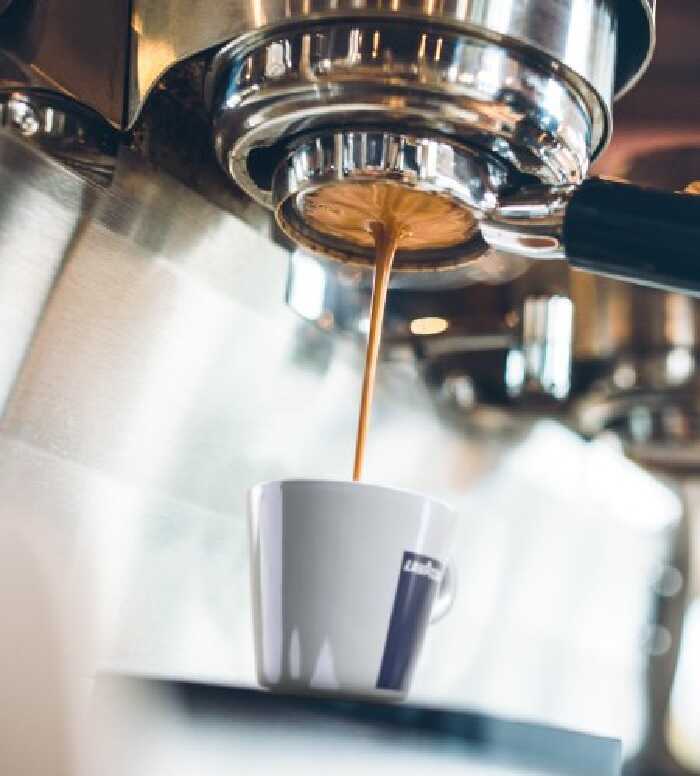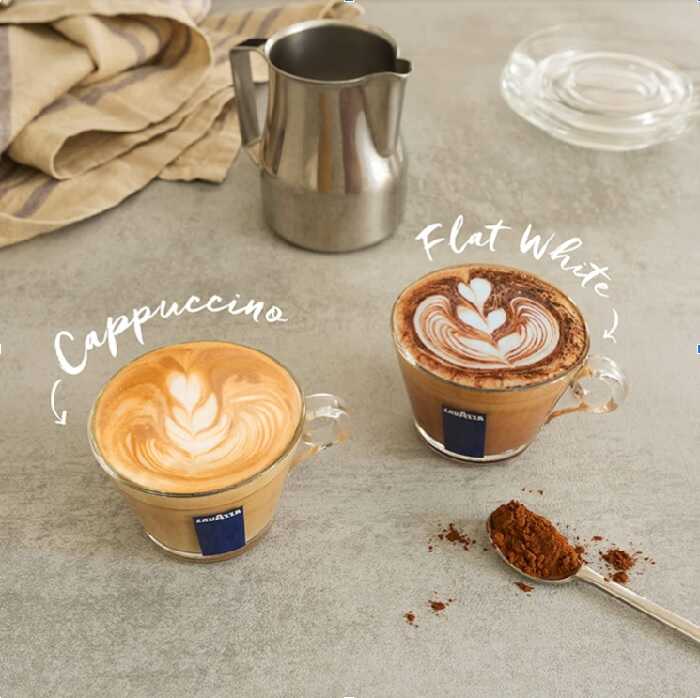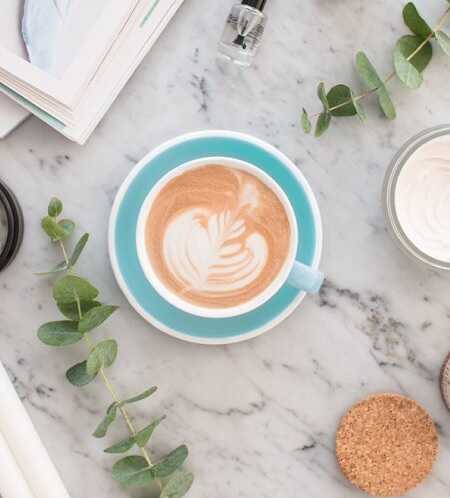Caffeine is a stimulant that is commonly used to increase energy and mental alertness. However, do you know how much caffeine in coffee is best for your health?
While it works wonders in keeping you awake and reducing fatigue, it is not recommended to drink a lot of coffee daily, as caffeine may negatively affect your health. Some common issues are anxiety, insomnia, high pressure, etc.
In this article, we will explain the amount of caffeine in different coffee drinks and give a recommendation for the daily intake. Keep on reading, and you will be able to set a suitable limit for coffee to drink every day!
Contents
How Much Caffeine In Coffee?

A cup of espresso contains about 63 mg of caffeine. And a decaf coffee only contains 3 mg of caffeine.
On average, a brewed cup of coffee with a capacity of 8 oz has about 95 mg of caffeine.
There is no definite number for how much caffeine in a cup of coffee. The caffeine content may change due to the type of coffee.
Brewed Coffee
Brewed coffee is also known as regular coffee. This type of coffee is usually ground from arabica coffee and robusta coffee beans.
The amount of caffeine in brewed coffee is from 70 mg to 140 mg. On average, the content is 95 mg.
Espresso
Espresso has a higher volume of caffeine than regular coffee, although a cup of it may be a lot smaller than a cup of brewed coffee.
A full shot of espresso usually takes up about 1 – 1.75 oz of the cup. The caffeine content is averagely about 63 mg.
Most people do not drink a shot at once. They prefer ordering a double shot of espresso. This drink will contain about 126 mg of caffeine.
Espresso-Based Drinks
In many cafes, the barista may mix espresso with other ingredients, such as hot water, milk, sugar, etc. The coffee mixture will be easier to drink and have lower caffeine content.
Some espresso-based drinks we can list are:
- Latte
- Cappuccino
- Macchiato
- Americano
The caffeine content is then counted based on the size of the cup.
An S-size cup (Small) may have 63 mg of caffeine. An L-size cup (Large) will have 125 mg of caffeine.
Instant Coffee
Instant coffee is a freeze-dried version of brewed coffee. This drink is made throughout many processes and mixed with milk, sugar, etc.
Compared to regular coffee, instant coffee has a lower volume of caffeine. A cup of it contains about 30 mg – 90 mg.
Decaf Coffee
Decaf coffee stands for decaffeinated coffee. However, the truth is not as the name describes.
Many people think that decaf coffee has no caffeine. However, this drink still has a small amount of this substance.
It is quite hard for manufacturers to remove all caffeine completely. They can only reduce the content to the minimum.
A cup of brewed decaf coffee may contain 3 mg – 7 mg of caffeine.
Are Commercial Brands More Caffeinated?

The coffee you buy from commercial brands always has more caffeine than one you brew by yourself at home.
Starbucks
Starbucks offers four options for cup sizes of brewed coffee. Each cup contains a different amount of caffeine:
- 8 oz (Short cup): 180 mg
- 12 oz (Tall cup): 260 mg
- 16 oz (Grande cup): 330 mg
- 20 oz (Venti cup): 415 mg
Besides, a small shot of espresso that Starbucks sells has 75 mg of caffeine. The large size of espresso has 150 mg – 225 mg.
Decaf coffee at Starbucks contains 15 mg of caffeine at a minimum. If you order a big cup, the amount may be up to 30 mg.
McDonald’s
The amount of caffeine in the brewed coffee that McDonald’s sells is also based on the cup size.
- 12 oz (Small cup): 109 mg
- 16 oz (Medium cup): 145 mg
- 21 – 24 oz (Large cup): 180 mg
If you buy espresso from McDonald’s, the caffeine content in your drink may be 71 mg or higher due to the cup size. A decaf cup will have about 8 – 14 mg.
Dunkin Donuts
Based on the size, each cup of brewed coffee at Dunkin Donuts has the following amount of caffeine:
- 10 oz (Small cup): 215 mg
- 16 oz (Medium cup): 302 mg
- 20 oz (Large cup): 431 mg
- 24 oz (X-Large cup): 517 mg
The caffeine content in a single shot of espresso at Dunkin Donuts is 75 mg. The number is 150 mg if you order a double shot.
Dunkin Donuts sell decaf coffee in 2 different cup sizes:
- 10 oz (Small cup): 53 mg
- 24 oz (Large cup): 128 mg
Caffeine Recommended Daily Intake

You surely want to know how much caffeine in coffee is good for your health, right? We can not tell exactly the number because each person has a different response to this substance due to his/her metabolism and genetic system.
Some people may lose their sleep after drinking a small cup of coffee. However, some may still have a good sleep even after drinking many large cups.
Below is the safe amount of caffeine that a normal person can take daily, depending on his/her health and age. Of course, there are several people who can exceed our limit.
- A normal person (under 140 lbs) should not overdose more than 400 mg of caffeine per day.
- A female person (under 140 lbs) who is pregnant should consume less than 200 mg of caffeine daily.
- A person under 18 years old should not drink more than 100 mg of caffeine per day.
- Children under 15 years old should drink less than 50 mg of caffeine in a day.
How To Cut Down On Caffeine Consumption?

Here are some good ways to reduce the daily caffeine intake:
Change The Habits
If you want to cut down on caffeine intake, start by changing your habits.
There are two ways to avoid absorbing too much caffeine:
- Buy a small cup of coffee instead of a large cup
- Do not use coffee as daily energy drinks
Choose The Coffee Type That Has A Low Caffeine Content
As mentioned, coffee sold by commercial brands always has a high content of caffeine. Instead of buying coffee from these brands, you can try brewing coffee at home.
On the other hand, espresso-based coffee drinks contain lower caffeine than original espresso. You can try drinking this type of coffee to cut down on caffeine.
Using decaf coffee is also a great thing to avoid drinking too much since the manufacturers have reduced a high amount of caffeine in the decaf type.
Conclusion
Always keep an eye on how much caffeine in coffee that you drink! A too-high dose will cause bad effects on your health!
We have recommended a safe daily intake above based on age and health state. Follow our advice, and you will receive no health issues due to caffeine!
The Related Article
Comparison Articles
- Ninja CM400 Vs CM401
- Jura A1 vs Ena Micro 1
- Breville BES870XL Vs BES920XL
- Ninja CF091 Vs CM401
- Jura D6 Vs E6
()

